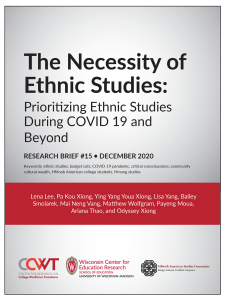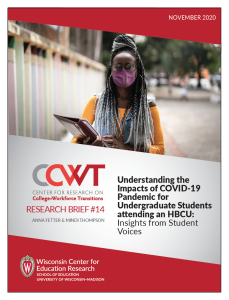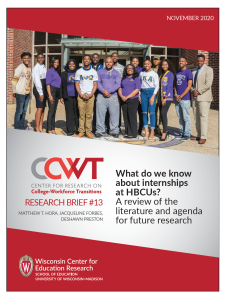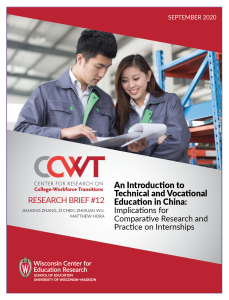Filter by Category:
Search
Year
- Category: Research Briefs
- Clear Filters
 Lee, L., Xiong, P., Xiong, Y., Yang, L., Smolarek, B., Vang, M., Wolfgram, M., Moua, P., Thao, A. & Xiong, O. (2020). The Necessity of Ethnic Studies: Prioritizing Ethnic Studies During COVID 19 and Beyond. Center for Research on College-Workforce Transitions (Research Brief #16). University of Wisconsin–Madison, Wisconsin Center for Education Research.
Lee, L., Xiong, P., Xiong, Y., Yang, L., Smolarek, B., Vang, M., Wolfgram, M., Moua, P., Thao, A. & Xiong, O. (2020). The Necessity of Ethnic Studies: Prioritizing Ethnic Studies During COVID 19 and Beyond. Center for Research on College-Workforce Transitions (Research Brief #16). University of Wisconsin–Madison, Wisconsin Center for Education Research.
Abstract: The Covid-19 pandemic has caused a devastating ripple effect on educational institutions—from budget cuts to health and safety concerns to changes in learning environments. In higher education specifically, Covid-19 is disrupting student lives by interrupting in-person learning, forcing students out of their living spaces, and causing students to suffer financially. The consequences of the pandemic have also led to financial crises for universities, causing administrators to make challenging budgetary decisions. Unfortunately, during times of budget scarcity, colleges and universities have historically opted—and continue to opt—for cuts that impact students of color profoundly, including deep cuts to diversity and inclusion efforts and ethnic studies programs, suspensions of ethnic studies faculty hiring, and even resulting in the termination of tenure-track faculty positions in ethnic studies (Bikales & Chen, 2020; Meyerhofer, 2020; Myers, 2014; Wang, 2016).
University administrators are currently having to make hard financial decisions which will have lasting impacts on students, staff, and their communities. Within this looming financial crisis, with multiple competing priorities and far less resources than in the past, in this report, we argue that ethnic studies programs must be prioritized for continued investment. Continued.
 Fetter, A & Thompson, M. (2020). Understanding the Impacts of COVID-19 Pandemic for Undergraduate Students attending an HBCU: Insights from Student Voices. Center for Research on College-Workforce Transitions (Research Brief #14). University of Wisconsin–Madison, Wisconsin Center for Education Research.
Fetter, A & Thompson, M. (2020). Understanding the Impacts of COVID-19 Pandemic for Undergraduate Students attending an HBCU: Insights from Student Voices. Center for Research on College-Workforce Transitions (Research Brief #14). University of Wisconsin–Madison, Wisconsin Center for Education Research.
Executive Summary: Limited attention has been paid to the impact of COVID-19 on college students who are attending minority-serving institutions, despite the disproportionate toll COVID-19 has on minoritized communities and the worsening of pre-existing inequity brought about by the pandemic (Kantamneni, 2020; Kimbrough, 2020; Strada, 2020). It is vital to understand experiences with COVID-19 among college students who are attending Historically Black Colleges and Universities (HBCUs), which serve as primary educational pathways for Black students in the U.S. Themes from our interviews with 41 students attending an HBCU highlight that students are experiencing significant work-related, academic, financial, and socio-emotional challenges related to COVID-19. Stressors and concerns were viewed by students as interrelated and cumulative. In addition, themes from the interviews suggested that student stressors must be viewed within the contexts of the higher education institution, student life experiences and circumstances, and their positionality within large structural systems. Given the far-ranging and ongoing impacts of COVID-19 on higher education, this Research Brief concludes with recommendations to advocate for and support students.
 Hora, M., Forbes, J., & Preston, D. (2020). What do we know about internships at HBCUs? A review of the literature and agenda for future research. Center for Research on College-Workforce Transitions (Research Brief #13). University of Wisconsin–Madison, Wisconsin Center for Education Research.
Hora, M., Forbes, J., & Preston, D. (2020). What do we know about internships at HBCUs? A review of the literature and agenda for future research. Center for Research on College-Workforce Transitions (Research Brief #13). University of Wisconsin–Madison, Wisconsin Center for Education Research.
Abstract: Internships and other high-impact practices (HIPs) that feature experiential learning are being increasingly promoted at Historically Black Colleges & Universities (HBCUs) as a way to support students’ career and academic success. In this paper we review the literature on what is known about HIPs and internships at HBCUs and how students’ racial identities have influenced interns’ experiences and outcomes. Our analysis finds little empirical research on internships at HBCUs and a general lack of in-depth and critical analysis on the ways that racial identity and the unique institutional cultures of HBCUs impact internships and Black student experiences. We then review contextual forces salient to Black interns’ experiences such as pervasive workplace discrimination, and theoretical frameworks that could inform future research on the ways that race, culture, institutional features and local “field effects” interact to shape student experiences and professional development. We conclude by outlining a research agenda for studying internships that foregrounds issues of racial justice, adopts elements of Bourdieu’s relational sociology, and investigates how the unique cultures of HBCUs influence how internships are designed, implemented and experienced.
 Zhang, J., Chen, Z., Wu, Z., & Hora, M. (2020). An Introduction to Technical and Vocational Education in China: Implications for Comparative Research and Practice on Internships. Research Brief #12. Center for Research on College-Workforce Transitions. UW-Madison.
Zhang, J., Chen, Z., Wu, Z., & Hora, M. (2020). An Introduction to Technical and Vocational Education in China: Implications for Comparative Research and Practice on Internships. Research Brief #12. Center for Research on College-Workforce Transitions. UW-Madison.
Abstract: Internship plays an important role in students’ career preparation and college-to-workforce transition. Although there are a large body of studies on college student internships, there were relatively fewer on that of technical and vocational education and training (TVET) students. Such a critical topic worth more attention and exploration. This report focuses on TVET system in China considering that China has the largest but under-developed TVET system in the world which prioritizes economic development and social mobility as its main missions. The aim of this report is to systematically introduce the TVET and its internship policies in China. The report presents the unique structure, the history, and development of China’s secondary and higher TVET. Notably, along with a downward trend of the secondary TVET since 2010, there had been an upward trend of the higher TVET since the late 1990s’ in contrast. Overall, issued policies largely influence the direction of Chinese TVET development, especially in regard to regulating internship activities in aspects of internship organization, management, assessment. Implications for research and policymaking for internships in China and the U.S. were discussed. This report provides insights to international scholars who are interested in conducting comparative studies on internship in TVET systems.
